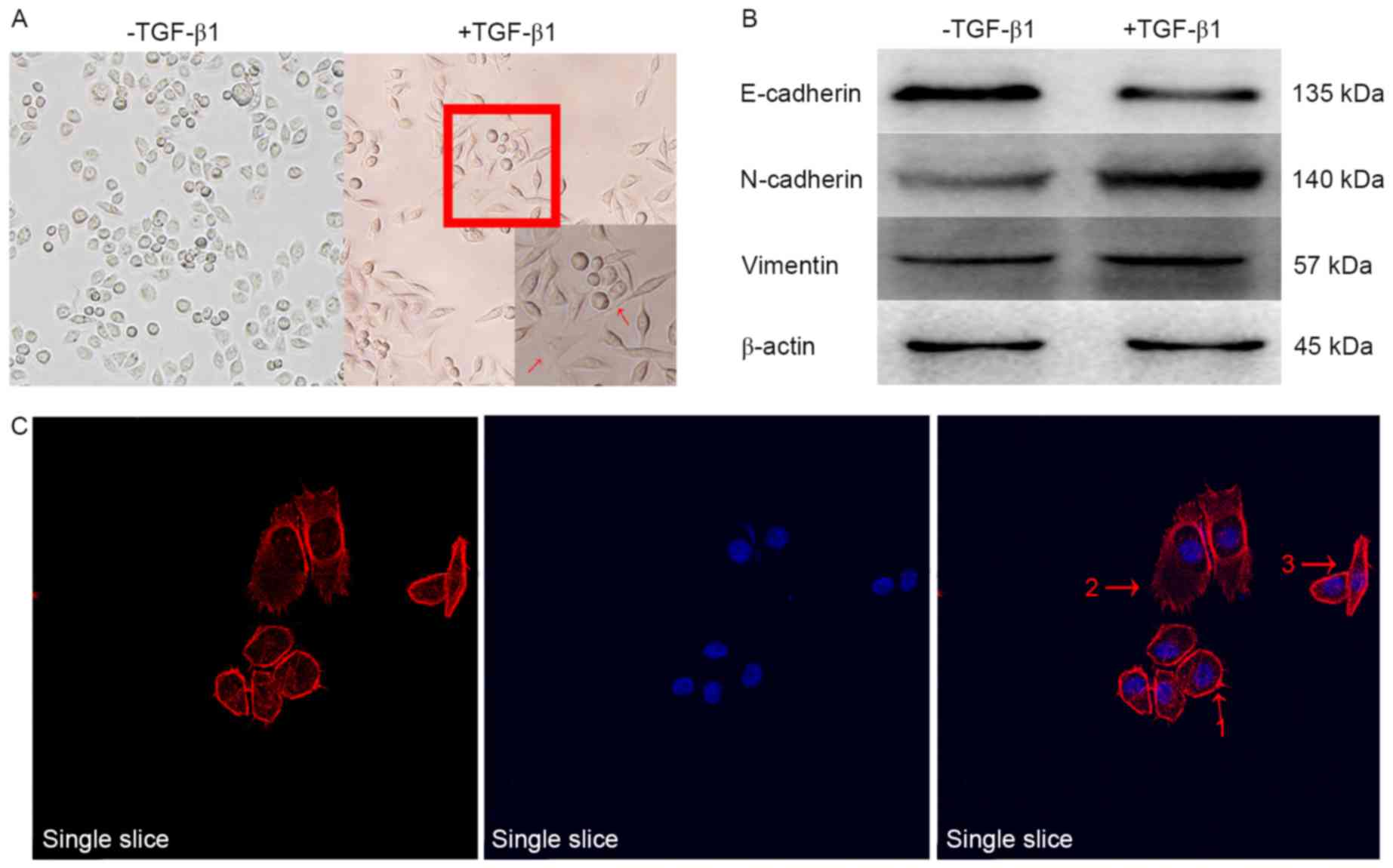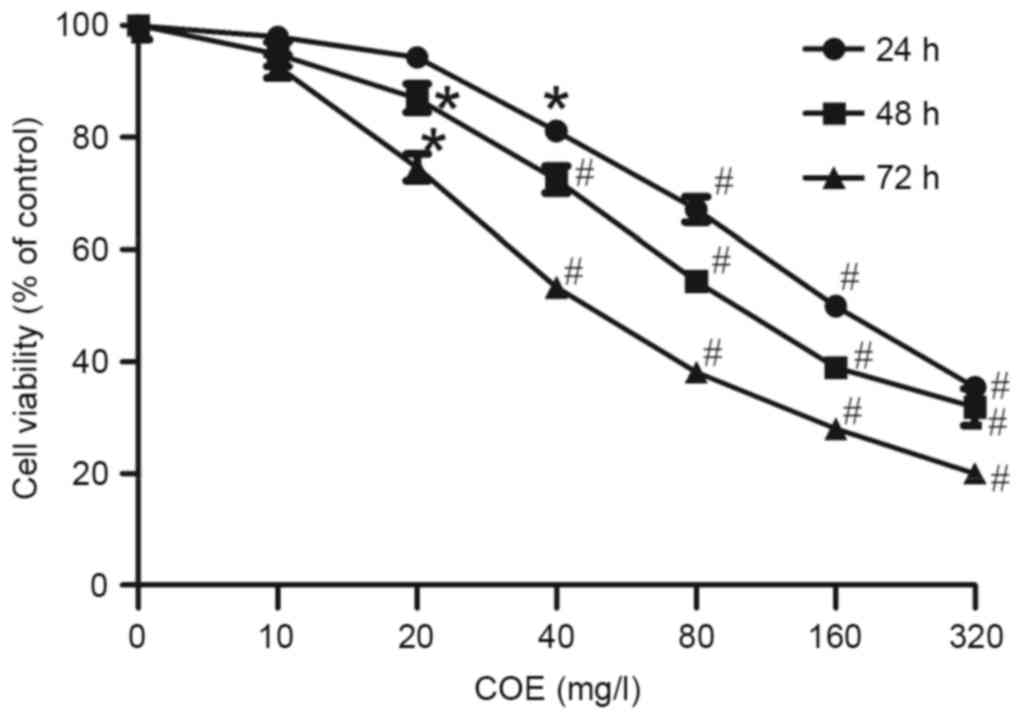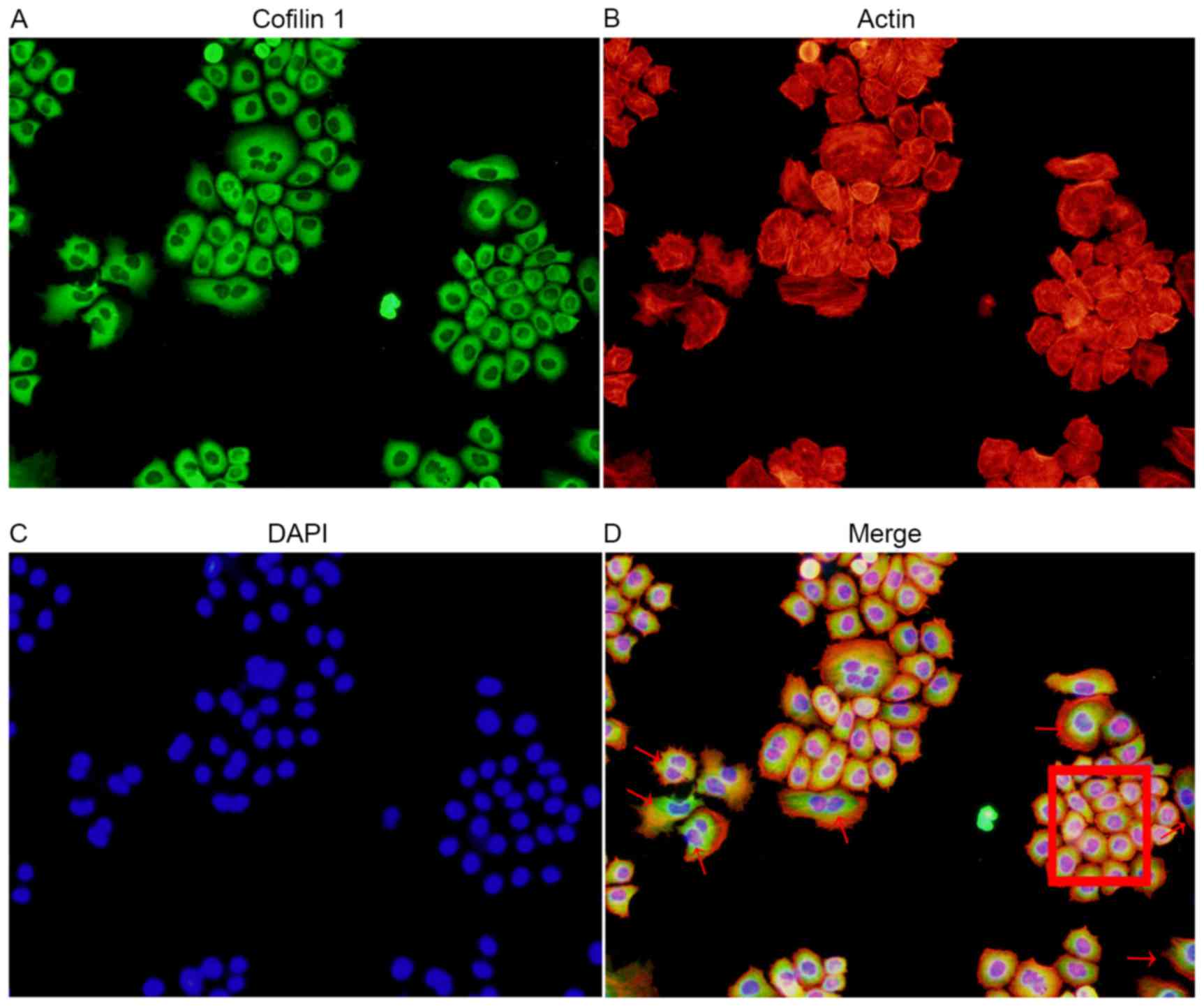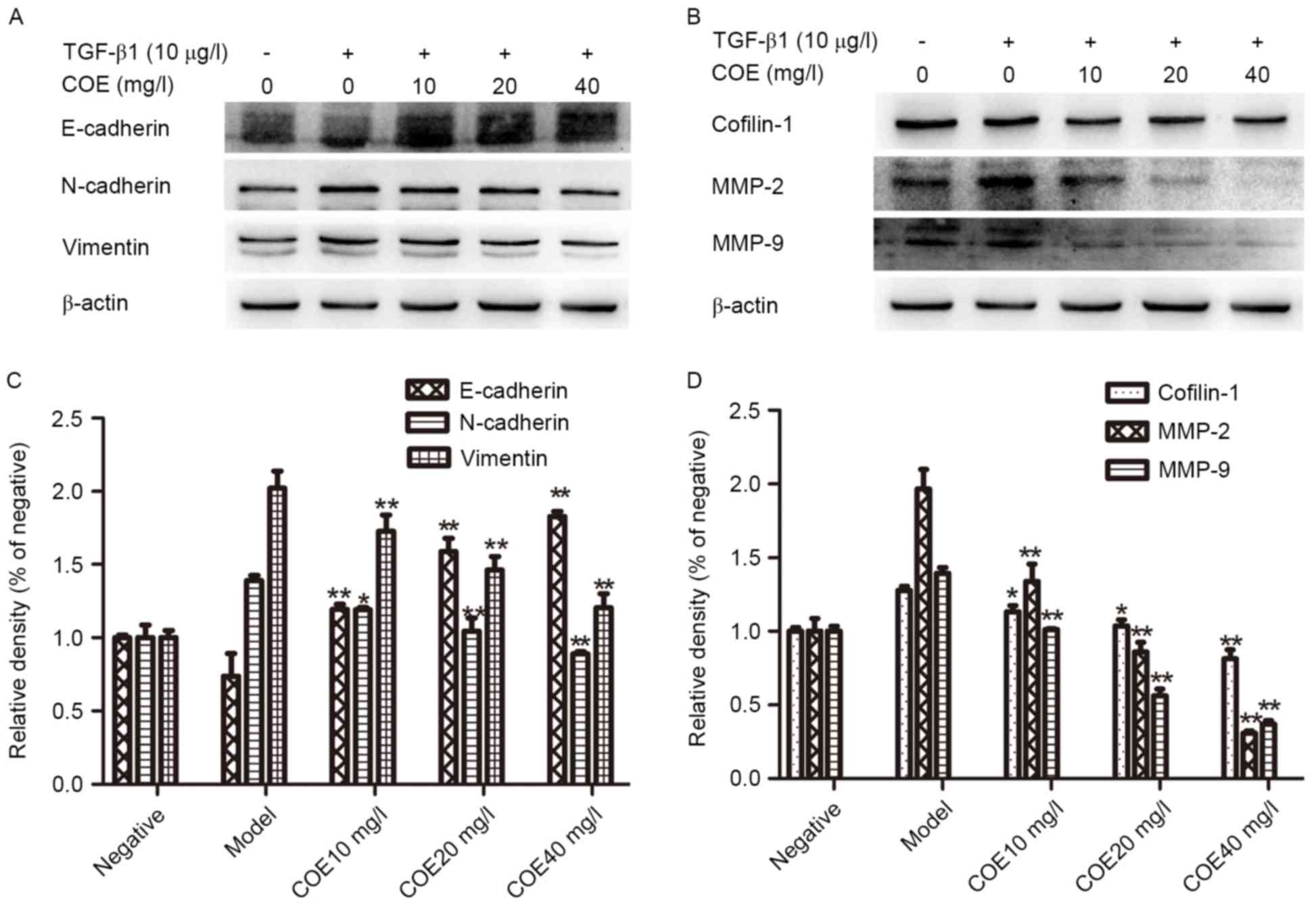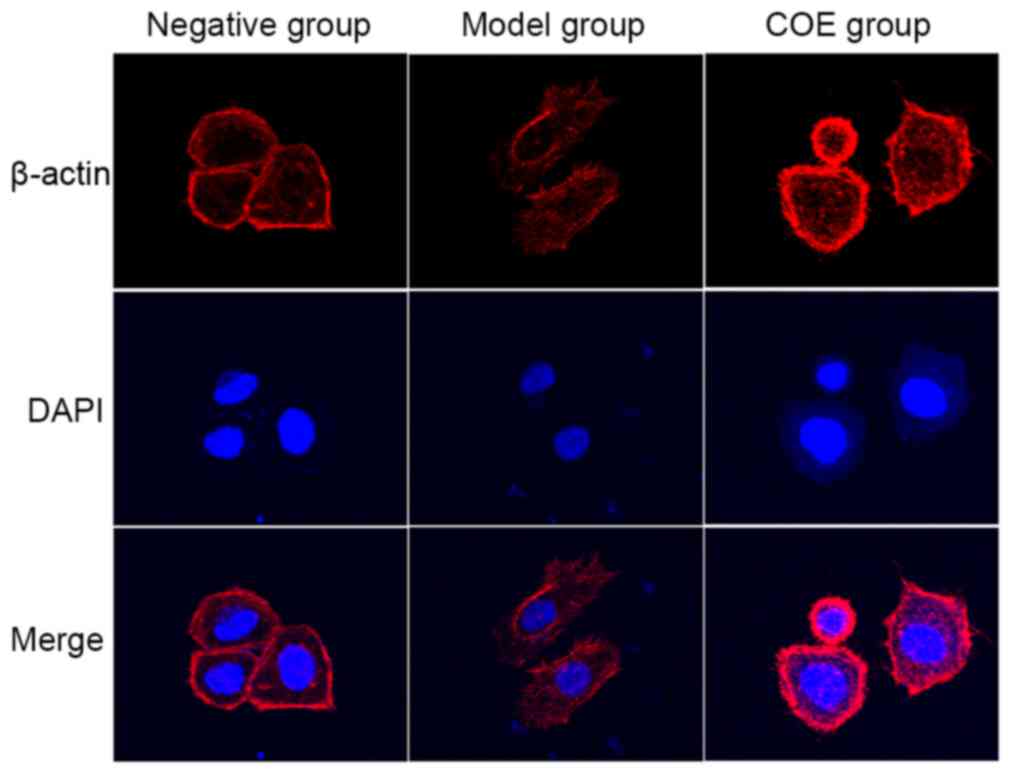|
1
|
Chen W, Zheng R, Baade PD, Zhang S, Zeng
H, Bray F, Jemal A, Yu XQ and He J: Cancer statistics in China,
2015. Ca Cancer J Clin. 66:115–132. 2015. View Article : Google Scholar
|
|
2
|
Ferlay J, Shin HR, Bray F, Forman D,
Mathers C and Parkin DM: Estimates of worldwide burden of cancer in
2008: GLOBOCAN 2008. Int J Cancer. 127:2893–2917. 2010. View Article : Google Scholar : PubMed/NCBI
|
|
3
|
Flemban A and Qualtrough D: The potential
role of hedgehog signaling in the luminal/basal phenotype of breast
epithelia and in breast cancer invasion and metastasis. Cancers
(Basel). 7:1863–1884. 2015. View Article : Google Scholar : PubMed/NCBI
|
|
4
|
Wang W, Mouneimne G, Sidani M, Wyckoff J,
Chen X, Makris A, Goswami S, Bresnick AR and Condeelis JS: The
activity status of cofilin is directly related to invasion,
intravasation and metastasis of mammary tumors. J Cell Biol.
173:395–404. 2006. View Article : Google Scholar : PubMed/NCBI
|
|
5
|
Tahtamouni LH, Shaw AE, Hasan MH, Yasin SR
and Bamburg JR: Non-overlapping activities of ADF and cofilin-1
during the migration of metastatic breast tumor cells. BMC Cell
Biol. 14:452013. View Article : Google Scholar : PubMed/NCBI
|
|
6
|
Han L, Stope MB, de Jesús ML, Oude
Weernink PA, Urban M, Wieland T, Rosskopf D, Mizuno K, Jakobs KH
and Schmidt M: Direct stimulation of receptor-controlled
phospholipase D1 by phospho-cofilin. EMBO J. 26:4189–4202. 2007.
View Article : Google Scholar : PubMed/NCBI
|
|
7
|
Wang WS, Zhong HJ, Xiao DW, Huang X, Liao
LD, Xie ZF, Xu XE, Shen ZY, Xu LY and Li EM: The expression of CFL1
and N-WASP in esophageal squamous cell carcinoma and its
correlation with clinicopathological features. Dis Esophagus.
23:512–521. 2010. View Article : Google Scholar : PubMed/NCBI
|
|
8
|
Wu Y, Tang Y and Zhang Y:
Clinicopathological significance of cofilin-1 in gastric cancer
tissues. Cancer Res Prev Treat. 39:295–298. 2012.
|
|
9
|
Cho HJ, Baek KE, Kim IK, Park SM, Choi YL,
Nam IK, Park SH, Im MJ, Yoo JM, Ryu KJ, et al: Proteomics-based
strategy to delineate the molecular mechanisms of RhoGDI2-induced
metastasis and drug resistance in gastric cancer. J Proteome Res.
11:2355–2364. 2012. View Article : Google Scholar : PubMed/NCBI
|
|
10
|
Zhu Y, Liu Y, Qian Y, Dai X, Yang L, Chen
J, Guo S and Hisamitsu T: Research on the efficacy of Celastrus
orbiculatus in suppressing TGF-β1-induced epithelial-mesenchymal
transition by inhibiting HSP27 and TNF-α-induced NF-κB/Snail
signaling pathway in human gastric adenocarcinoma. BMC Complement
Altern Med. 14:4332014. View Article : Google Scholar : PubMed/NCBI
|
|
11
|
Qian YY, Zhang H, Hou Y, Yuan L, Li GQ,
Guo SY, Hisamits T and Liu YQ: Celastrus orbiculatus extract
inhibits tumor angiogenesis by targeting vascular endothelial
growth factor signaling pathway and shows potent antitumor activity
in hepatocarcinomas in vitro and in vivo. Chin J Integr Med.
18:752–760. 2012. View Article : Google Scholar : PubMed/NCBI
|
|
12
|
Zhang H, Qian Y, Liu Y, Li G, Cui P, Zhu
Y, Ma H, Ji X, Guo S and Tadashi H: Celastrus orbiculatus extract
induces mitochondrial-mediated apoptosis in human hepatocellular
carcinoma cells. J Tradit Chin Med. 32:621–626. 2012. View Article : Google Scholar : PubMed/NCBI
|
|
13
|
Xiao Ke, Chen Xiaoqing, Wang Qiang, et al:
Research of chemical composition of celastrus orbiculatus Thunb.
Chinese Herbal Med. 38:14552007.
|
|
14
|
Li JJ, Yang J, Lu F, Qi YT, Liu YQ, Sun Y
and Wang Q: Chemical constituents from the stems of Celastrus
orbiculatus. Chin J Nat Med. 10:279–283. 2012. View Article : Google Scholar
|
|
15
|
Zan K, Chen X-Q, Wang Q and Cao L:
Chemical constituents in stem of Celastrus orbiculatus. Chin Trad
Herbal Drugs. 38:14552007.
|
|
16
|
Croisé P, Estay-Ahumada C, Gasman S and
Ory S: Rho GTPases, phosphoinositides, and actin: A tripartite
framework for efficient vesicular trafficking. Small GTPases.
5:e294692014. View Article : Google Scholar : PubMed/NCBI
|
|
17
|
Felipe Lima J, Nofech-Mozes S, Bayani J
and Bartlett JM: EMT in breast carcinoma - A review. J Clin Med.
5(pii): E652016. View Article : Google Scholar : PubMed/NCBI
|
|
18
|
Zhang S, Wu L, Liu Q, Chen K and Zhang X:
Impact on growth and invasion of gastric cancer cell lines by
silencing NEDD9. Onco Targets Ther. 8:223–231. 2015. View Article : Google Scholar : PubMed/NCBI
|
|
19
|
Delorme V, Machacek M, DerMardirossian C,
Anderson KL, Wittmann T, Hanein D, Waterman-Storer C, Danuser G and
Bokoch GM: Cofilin activity downstream of Pak1 regulates cell
protrusion efficiency by organizing lamellipodium and lamella actin
networks. Dev Cell. 13:646–662. 2007. View Article : Google Scholar : PubMed/NCBI
|
|
20
|
Wang W, Mouneimne G, Sidani M, Wyckoff J,
Chen X, Makris A, Goswami S, Bresnick AR and Condeelis JS: The
activity statusofcofilin is directly related to invasion,
intravasation, and metastasis of mammary tumors. J Cell Biol.
173:395–404. 2006. View Article : Google Scholar : PubMed/NCBI
|
|
21
|
Gabrielsen M, Schuldt M, Munro J, Borucka
D, Cameron J, Baugh M, Mleczak A, Lilla S, Morrice N and Olson MF:
Cucurbitacin covalent bonding to cysteine thiols: The
filamentous-actin severing protein Cofilin1 as an exemplary target.
Cell Commun Signal. 11:582013. View Article : Google Scholar : PubMed/NCBI
|
|
22
|
Oleinik NV, Helke KL, Kistner-Griffin E,
Krupenko NI and Krupenko SA: Rho GTPases RhoA and Rac1 mediate
effects of dietary folate on metastatic potential of A549 cancer
cells through the control of cofilin phosphorylation. J Biol Chem.
289:26383–26394. 2014. View Article : Google Scholar : PubMed/NCBI
|
|
23
|
Galkin VE, Orlova A, VanLoock MS, Shvetsov
A, Reisler E and Egelman EH: ADF/cofilin use an intrinsicmode of
F-actin instability to disrupt actin filaments. J Cell Biol.
163:1057–1066. 2003. View Article : Google Scholar : PubMed/NCBI
|
|
24
|
Sidani M, Wessels D, Mouneimne G, Ghosh M,
Goswami S, Sarmiento C, Wang W, Kuhl S, El-Sibai M, Backer JM, et
al: Cofilin determines the migration behavior and turning frequency
of metastatic cancer cells. J Cell Biol. 179:777–791. 2007.
View Article : Google Scholar : PubMed/NCBI
|
|
25
|
Delorme V, Machacek M, DerMardirossian C,
Anderson KL, Wittmann T, Hanein D, Waterman-Storer C, Danuser G and
Bokoch GM: Cofilin activity downstream of Pak1 regulates cell
protrusion efficiency by organizing lamellipodium and lamella actin
networks. Dev Cell. 13:646–662. 2007. View Article : Google Scholar : PubMed/NCBI
|
|
26
|
Chang FR, Hayashi K, Chen IH, Liaw CC,
Bastow KF, Nakanishi Y, Nozaki H, Cragg GM, Wu YC and Lee KH:
Antitumor agents. 228. Five new agarofurans, reissantins A-E, and
cytotoxic principles from Reissantia buchananii. J Nat Prod.
66:1416–1420. 2003. View Article : Google Scholar : PubMed/NCBI
|
|
27
|
Yuan L, Zhang H, Qian YY, Hou Y, Zhu YD,
Ma H, Guo SY, Tadashi H and Liu YQ: Effects of serum containing
Celastrus orbiculatus extracts on proliferation and VEGF-c
expression in hepatoma cells of mice. Chin J Experimental
Traditional Med Formulae. 17:1572011.
|
|
28
|
Yang Qingwei, Liu Li, Liu Weiwei, et al:
Effects of Celastrus orbiculatus extract on suppressing invasion
and metastasis of human hepatoma 7721 cells. Chin Herbal Med.
40:4342009.
|
|
29
|
Wang Haibo, Qian Yayun, Zhu Yaodong, et
al: Effects of Celastrus orbiculatus extract on suppressing the
epithelial-mesenchymal transition of human gastric adenocarcinoma
cells by inhibiting cofilin 1 signaling pathway. Li Shi Zhen Medi
Materia Medica Res. 27:303–307. 2016.
|
|
30
|
Hua H, Li M, Luo T, Yin Y and Jiang Y:
Matrix metalloproteinases in tumorigenesis: An evolving paradigm.
Cell Mol Life Sci. 68:3853–3868. 2011. View Article : Google Scholar : PubMed/NCBI
|
|
31
|
Haibo W, Lide T, Feng J, Hao G, Xiaojun D,
Tengyang N, Jun F, Yanbing D, Weiming X, Yayun Q and Yanqing L:
Cofilin 1 induces the epithelial-mesenchymal transition of gastric
cancer cells by promoting cytoskeletal rearrangement. Oncotarget.
2017.(Epub ahead of print). View Article : Google Scholar : PubMed/NCBI
|
|
32
|
Hitchcock-Degregori SE: Chemotaxis:
Cofilin in the driver's seat. Curr Biol. 16:R1030–R1032. 2006.
View Article : Google Scholar : PubMed/NCBI
|
|
33
|
Estornes Y, Gay F, Gevrey JC, Navoizat S,
Nejjari M, Scoazec JY, Chayvialle JA, Saurin JC and Abello J:
Differential involvement of destrin and cofilin-1 in the control of
invasive properties of Isreco1 human colon cancer cells. Int J
Cancer. 121:2162–2171. 2007. View Article : Google Scholar : PubMed/NCBI
|















